Dems Forum Part 2: How Loud Is Loud?
Editor’s note: A forum hosted by the Ann Arbor Democratic Party on Saturday, June 8, 2013 drew six of seven total city council candidates who’ve qualified for the primary ballot.
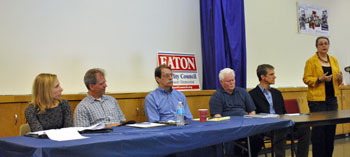
From left: Julie Grand (Ward 3 challenger), Stephen Kunselman (Ward 3 incumbent), Jack Eaton (Ward 4 challenger), Mike Anglin (Ward 5 incumbent), Kirk Westphal (Ward 2 candidate), Sabra Briere (Ward 1 incumbent).
In the Aug. 6 Democratic primary, only two wards offer contested races. In Ward 3, Democratic voters will choose between incumbent Stephen Kunselman and Julie Grand. Ward 4 voters will have a choice between incumbent Marcia Higgins and Jack Eaton. Higgins was reported to have been sick and was unable to attend.
The format of the event eventually allowed other candidates who are unopposed in the Democratic primary to participate: Mike Anglin (Ward 5 incumbent), Sabra Briere (Ward 1 incumbent), and Kirk Westphal, who’s challenging incumbent Jane Lumm in Ward 2. Lumm, who was elected to the council as an independent, was in the audience at the forum but didn’t participate. The event was held at the Ann Arbor Community Center on North Main Street. The Chronicle’s coverage is presented in a multiple-part series, based on common threads that formed directly in response to questions posed to the candidates, or that cut across multiple responses.
Although they were not asked an explicit question about their personal style of engagement, candidates commented on the topic throughout the forum. A question about the council’s overall performance – with attention to factionalism in the group – prompted much of that commentary.
That question came relatively late in the forum. But opening remarks from Ward 3 candidate Julie Grand put the issue on the table, when she described herself as not necessarily wanting to be the loudest or most polarizing voice in the room. It was a bid to contrast herself with incumbent Stephen Kunselman, whose critics would likely characterize him as a loud and polarizing influence on the council.
Kunselman’s introductory remarks came immediately following Grand’s. And in a somewhat ironic twist, Kunselman had to be encouraged by the audience to speak up – because they couldn’t hear him. As the forum progressed, Kunselman turned up the volume. The substance of his response, which was echoed by other incumbents, rested in part on the idea that the council’s dynamic now, with its current composition, is better than it was five years ago. Candidates’ remarks related to this issue are presented in more detail below the fold.
Part 1 of this series focused on the candidates’ concept of and connection to Ann Arbor. Other themes from the forum will be presented in subsequent reports. Other Chronicle coverage is tagged with “2013 primary election.”
Composition of the Council
Julie Grand led off her introductory remarks by saying the core message of her campaign is not to be the loudest voice, and it’s not to be the most polarizing voice, but rather “to listen to you, work for you, and make informed, thoughtful decisions.”
Stephen Kunselman’s opening remarks, which followed Grand’s, didn’t respond directly to the implicit criticism she made. Instead, he focused on what he perceives as improvements in the council’s basic approach to issues.
By way of background, the November 2012 elections resulted in three new members on the council – Democrats Sumi Kailasapathy (Ward 1), Sally Petersen (Ward 2) and Chuck Warpehoski (Ward 5). The previous year, independent Jane Lumm (Ward 2) joined the council. Compared to 2007, when Democrats Sabra Briere (Ward 1) and Mike Anglin (Ward 5) were first elected, the composition of the council is different. Asterisks flag those current councilmembers who were not serving on the council back in 2007.
Ann Arbor City Council Composition
2007 2013
Ward 1 Sabra Briere Sabra Briere
Ron Suarez Sumi Kailasapathy*
Ward 2 Stephen Rapundalo Jane Lumm*
Joan Lowenstein Sally Petersen*
Ward 3 Stephen Kunselman Christopher Taylor*
Leigh Greden Stephen Kunselman
Ward 4 Marcia Higgins Marcia Higgins
Margie Teall Margie Teall
Ward 5 Mike Anglin Mike Anglin
Christopher Easthope Chuck Warpehoski*
Mayor John Hieftje John Hieftje
-
At the June 8 forum, Kunselman said that in December 2012, with new councilmembers seated at the table, the council started taking a new direction.
The council was going places where he thought the community as a whole expected the council to go. That included making sure that the council puts all the cards on the table so that the community knows what the council is debating. The best decisions are made when all the players have all the information on the table, Kunselman said: “No more poker politics. No more hiding cards …” That’s the difference between his political philosophy and that of others, who disagree with his intent, Kunselman contended.
Jack Eaton ventured that recent elections have started to “turn the tide” on the council. The composition of the council had changed, and he felt the result was that council is now responding to residents’ needs and neighborhood concerns. He pointed out some of the specific accomplishments he felt were attributable to the new council. One was the abandonment of the proposal to reconfigure the fire stations [which would have reduced the number from five to three stations]. Another was the city’s withdrawal from the countywide transit plan, and the pausing of a plan to build a train station on city parkland. And finally, he described how a plan had been put off to reduce the frequency of trash pickup. All those examples, he believed, resulted from the different representation that is now seated at the council table.
And later in the forum, Eaton alluded to the current composition of the council by saying he was running for a seat to help those who have been elected recently move forward on sensible spending priorities.
Mike Anglin commented on the number of candidates for city council who had appeared at the forum, saying he thinks that shows a healthy city, a healthy environment. He also picked up on the theme of a shift on the council. Since 2007, there’s been a dramatic change on council, he said. Some votes are now turning out 6-5. When he first won election to the council, he recalled a 10-1 vote on the issuance of bonds for the new underground parking garage. He’d voted against it, because he thought that spending several million dollars on that project was a “waste to this community” and would have financial implications for years to come. We are now experiencing those financial implications, he contended.
Anglin also noted that when the police/courts building was constructed, he’d asked the police if they would rather have a job or a nice place to work – and they’d told him that they’d rather have jobs. But the council had said, Sorry, we are building it, Anglin recalled.
Anglin said he was pleased to serve with the people who are now sitting on the council, “because we’re having an open dialogue at last. Things are being done openly – finally.” He said it’s taken a long time. And to the degree that Ann Arbor remains a transparent community, Anglin continued, it will remain a strong community. People should know what’s happening. There should not be a small group that goes around making decisions because they can say: We have six votes, and we’re just going to pass it, and we’re going to leave the rest of the five out of the discussion. That’s unfortunate for a democracy, he said.
Anglin also stated that he thought elected officials should be held accountable for the votes that they take. He contended that it’s very hard for anyone as a citizen to figure out who has voted what way on an issue. When the new council is elected, he hoped that some measures could be taken to improve transparency – listing the votes on an issue, who voted for it and voted against it by name. It would become a permanent record that any taxpayer can look up, he said. [The council's minutes are available online through the city's Legistar system. The outcome of roll call votes is recorded by name.]
Anglin compared trust in government to trust in friends: “Individuals who are friends of yours, you trust them. Why? Because they tell you the truth. You don’t have a close friend who lies to you. You don’t have friends like that; you drop them from your life.” The government has to be trustworthy, he said, and he thinks the council is moving very strongly in that direction – and he’s proud to be a part of it.
In her remarks, Sabra Briere reflected on the fact that she and Anglin had joined the council at the same time and in many ways they shared the same values. At that time, in 2007, she and Anglin had been able to work with Kunselman and with former Ward 1 councilmember Ron Suarez for the first year. Working together, she said, they’d learned a lot about “who listens to what.” And one of the more interesting things from that effort was to get neighborhood voices heard around the council table. Her own background in neighborhood organizing led her to believe that some issues significantly impacting neighborhoods are not listened to by the council.
Briere noted that she’d lived through the earlier era of the council – as Kunselman and Anglin had – when there was perhaps a little bit less open discussion at the council table. The meetings were a lot shorter then, she observed. And that’s really the trade-off, she ventured: Meetings are a lot shorter when everyone knows what they’re basically going to say, and they say it, and the vote is taken, and you move on to the next issue. The fact that the council’s meetings go longer than they used to can be a detriment to those who are watching and listening, she allowed. It can also be a detriment to councilmembers who are getting really weary from being at the meeting. But the important thing is that councilmembers are expressing their different viewpoints. They are trying to find a position as a group that is a consensus voice, she said.
The more voices and the more viewpoints the council has, the richer the council discussion gets, Briere said. Sure, sometimes councilmembers get annoyed with each other because they don’t agree. But that’s ok, she ventured, because they’ll agree on the next item that comes up on the agenda – that’s the way it works. So whoever sits on the city council might change the dynamic of that group of 11 people. That changing dynamic makes life interesting for councilmembers sitting there, but it makes life better for residents, because they get to pick those voices, she concluded.
Personal Style
Sabra Briere described her approach to getting neighborhood issues in front of the council as “behind the scenes” – because she is a “quieter person.” But whether you are quiet or whether you are really visibly noisy, the council benefits from all those different viewpoints, she said. The council benefits, but so do residents, she continued, because “you may hold one view and your spouse, frankly, may hold a conflicting view.” The remark drew laughs, because Briere’s spouse is local attorney David Cahill, who was in the audience and is not known for having weakly-held views.
No one should ever think they speak for everybody, Briere cautioned. The council should never speak with a single voice, because then it would not be representing all of the views of the community. Through the give-and-take of the council, what makes it an enriching experience is to see how the positions she holds can be moderated by the position someone else holds, Briere said.
Julie Grand felt it’s important to have different voices – but stressed that those voices need to listen to one another. And they need to be motivated by information, and they need to be motivated for the right reasons of working for the city, she said.
Grand contrasted “differences of opinion” with “divisiveness and polarization.” Differences of opinion can lead to really strong decisions. But divisiveness and polarization very rarely accomplish anything, Grand cautioned. She stated that she doesn’t appreciate the viewpoint of some members of the current council that puts them on teams: ”I’m on this team, and you’re on that team.” Grand said she has a four-year-old and a seven-year-old, and she reported that “team” dynamic is present in her own household more than she would like. She doesn’t like that dynamic in the federal government, and she doesn’t like it in the state government. And she feels “we are better than that.” Ann Arbor is worthy of a city council that does not “play teams,” she said.
Her leadership on the city’s park advisory commission has been consensus-driven, Grand said. [She is chair of PAC; her term ends in October.] If you ask anybody who has served with her, Grand continued, they’d say she does not try to shove her own viewpoint down anyone’s throat. When there’s a contentious issue, she tries to listen to those other voices and share her own opinion and then determine what it takes to make a compromise. She felt she has a strong record of doing that, and she wants to bring it to the council.
Kunselman responded to Grand by saying he appreciated her comments about not tending toward divisiveness and polarization. He contended that’s what has been accomplished with the changes to the composition on the council as of December 2012. Previously, there hadn’t been divisiveness or polarization, because there was isolation and hostility, he said – but it was kept behind the scenes. Some councilmembers were attacking others, stabbing them in the back, talking about other councilmembers in e-mails sent during council meetings. That was hostile, Kunselman said. But that’s no longer happening, he added, and that will be gone forever as long as he serves on the council.
Kunselman indicated that he now feels comfortable that he can rely on his council colleagues to help him deal with the amount of information councilmembers have to contend with. The idea of divisiveness and polarization was in the past, he contended.
At a different point in the forum, Kunselman indicated that he didn’t mind if his approach resulted in some people taking a personal dislike of him. He quoted from the May 8, 2013 broadcast of the Colbert Report [a satirical reportage broadcast on Comedy Center]: “Yes, the definition of leadership is getting people who despise you to listen to you.” Kunselman didn’t include the punch line: “It’s also the definition of the Eagles.” Although Colbert’s line has been widely reported as “to listen to you” and would be more consistent with the put-down of the 1970s band, Colbert may have flubbed the line when he actually said “to work with you.”
Responding later in the forum, Briere said Kunselman’s allusion to the Colbert quote amused her – the idea that if people despise you and listen to you, then you’re doing something right. Briere ventured that it’s also true that if people disagree with you and they listen to you, and they change their mind, then you are doing something right.
Jack Eaton noted it’s important to remember that about 90% of council votes are unanimous – observing that there isn’t that much disagreement. He also stressed the importance of remembering that all councilmembers actually have good intentions: They really want what’s best for the city. There may be disagreements about how to achieve what’s best for the city, and even disagreements about what is best for the city. But Eaton reiterated that he thinks everybody comes to the table with good intentions. You have to respect those you disagree with, he continued.
Eaton described the councils of the past as making too many decisions in secret among a group of people who voted in lockstep. Over time that has changed, he said, and much more of the discussion happens at the council table. There’s a perception that the discussion by the council has gotten “louder,” but he felt that’s because good, healthy democracy is going to include disagreement.
Eaton ventured that he would disagree with some of the people at the table, and he would do it in a civil tone – and he was going to expect the same. He applauded Ward 2 councilmember Jane Lumm for taking a stand at a recent council meeting, saying that it was unacceptable to make personal attacks on another councilmember just because you disagree. [The occasion was the council's April 15, 2013 meeting, when Lumm delivered a rebuke of mayor John Hieftje along those lines.] Eaton said he would want to be that same kind of voice. He’d enthusiastically disagree with some councilmembers but he wouldn’t make it personal. He’d also not let anybody on the council turn things into a personal issue about him or anybody else on the council.
Mike Anglin gave some examples of community discussions that eventually had productive outcomes – Argo Dam and Huron Hills golf course. The Argo Dam discussion had begun with the possibility of removing the dam, but had ended with the result of the construction of Argo Cascades, Anglin said. He called it an example of open politics, and said he was very proud of that discussion.
Commenting on the question of factions on the council, Kirk Westphal was struck by the fact that there are relatively few forums that bring out this kind of discussion: “I have learned a lot already today.” Westphal echoed something that Briere said about “quiet, productive discussions.” Those discussions might happen on the committee level, or just among members of a board before coming to the city council. That was where he felt it was possible to have a really positive discussion.
Westphal referred to how much “angst and political capital” has been used in the council’s recent discussion of the Ann Arbor Downtown Development Authority. Specific issues had been brought up about the DDA a few years ago, then they seemed go away. But when they come back to the council table, the issue becomes “fraught,” he said. If there are concerns about the DDA’s mission, or if there are concerns about the DDA’s budget, these things have to be pursued, he allowed – but they’re not exciting.
“Committee meetings don’t make headlines,” but they have to be kept up on, Westphal stressed. He said that it hurts him to see an issue being used “as a club” and start dividing the council. He felt a lot of the un-exciting quiet work behind the scenes could smooth out some of these processes. If there’s concern about ethics, Westphal said, let’s have a robust ethics policy. Let’s get a working group on it now, before something else happens, and it becomes a divisive issue, he suggested. It’s not very exciting, he allowed, but that’s the kind of thing he would like to work on.
On the topic of personal style, Briere characterized herself as “not a very noisy person, but I’m a very determined person.” Later in the forum, when she immediately followed Kunselman in his remarks – which included a forceful call for the removal of Eli Cooper from the board of the Ann Arbor Transportation Authority – Briere ventured: “I am not nearly as exciting as what you just heard.”
She could be a bullish person, but she was quiet about it, she said. It’s a benefit to her when those people who are more bullish than she is push their issues. If the council is all a group of retiring, quiet people, then “we’re just going to want to get along with each other.” She said it’s necessary to have the tension that comes from different viewpoints, in order to make a solid mix – of strong voices with strong opinions and other people who are reflecting and thinking and finding a middle ground among those strong voices. That’s what the council is like today, Briere said.
On the general topic of personal style, Eaton said he wanted to be elected to add a civil voice to the council’s deliberations. He’d disagree with some people on council, but he would never make it personal. He’d never raise his voice to somebody or call them names, he said. It’s time for the council to be able to have open, honest discourse, he added, where councilmembers can disagree in public, yet treat each other with the respect that everybody deserves.
Working Together
Candidates were invited to “say something nice” about their opponents, or to name a policy position on which they agreed. They all managed to demonstrate that they were capable of engaging at that level.
Stephen Kunselman described how he and Julie Grand “go way back.” He noted that Grand was appointed to the park advisory commission at the time he was a councilmember back in 2007. He’d served on PAC as one of two council appointees to the commission that year. Kunselman felt that Grand had really put a lot of effort and desire into improving the recreational and infrastructural needs of the park system. One of the things he thinks that he and Grand really agree on is the need to make sure that the city’s park system is the best park system that it can possibly be.
Within the park system, Kunselman highlighted the skatepark at a point of major agreement. He called it the most significant accomplishment since 2008 when he and Grand served on PAC together. He thought there would be a contract coming before the city council pretty soon, and that it would start construction. When you think of the years involved, with his advocacy, and Grand’s involvement, as well as PAC, this is a significant, accomplishment for the community, he said. And Kunselman really appreciated Grand’s support on that.
Speaking about Kunselman, Grand also highlighted their shared passion for parks. She noted that the skatepark contract, as Kunselman had observed, was coming up next month before the park advisory commission. She called that exciting news and a great example of collaboration between the city and the county and private citizens. It’s a great example of what can be done when you think creatively, she said.
Besides parks, Grand said, she and Kunselman also care about their families. She reported that she’d had a great talk with his son just the other night about his career. [Kunselman's son recently graduated from college.] She thinks she and Kunselman are both really proud of their families. She thinks there’s no doubt that Kunselman cares about the neighborhoods and that he cares about the community. They may disagree about what direction the city needs to take to get that accomplished, but there’s no doubt Kunselman cares about the city, about the community and his neighborhood, she concluded.
About Marcia Higgins, Jack Eaton said: “Marcia and I actually get along well. I like Marcia. I have a lot of respect for her. It’s not personal. We just disagree about some issues.” One of the issues he and Higgins did agree about was the plan that the city administration had proposed last year to close some fire stations. He and Higgins had discussed this at length. She opposed it, he opposed it, and they agreed on that. He and Higgins had worked together to find other members of council to oppose the idea of closing fire stations.
Also during the forum, Sabra Briere offered a view of how the council as a group represents constituents. She allowed that there are ward boundaries, but essentially said there are no boundaries within the city when it comes to representing residents. She ventured there were no issues in other wards that she would not eventually hear about when they came before the council as a whole. When she hears concerns from residents in another ward, she passes them automatically to the members of the council serving that ward – but she also stores it in her brain, because that’s going to come back to the city council as a group.
Briere noted that Eaton had been right about 90% of the council’s votes being unanimous. Many issues simply are not contentious, she ventured. Issues in neighborhoods often are not contentious: Fixing Miller Road, fixing Packard Road, fixing Arborview – those are not contentious issues, she said. The council doesn’t have a disagreement that those roads need fixing. Contentious issues arise about those things that affect the city at large – and especially the downtown, because the downtown is shared everyone, she noted.
About current and future councilmembers, Briere said, “We serve you all. And there are no ward boundaries between the service we give and your needs.” Based on that, she encouraged audience members to raise their concerns with any of the candidates. If voters are not talking to the candidates, they are missing an opportunity, Briere said, as they could be affecting a candidate’s viewpoint when approaching service on the council.
“Nobody should only hear from their supporters,” Briere said. “Nobody should only hear from the people they disagree with.”
The Chronicle could not survive without regular voluntary subscriptions to support our coverage of public bodies like the Ann Arbor city council. Click this link for details: Subscribe to The Chronicle. And if you’re already supporting us, please encourage your friends, neighbors and colleagues to help support The Chronicle, too!




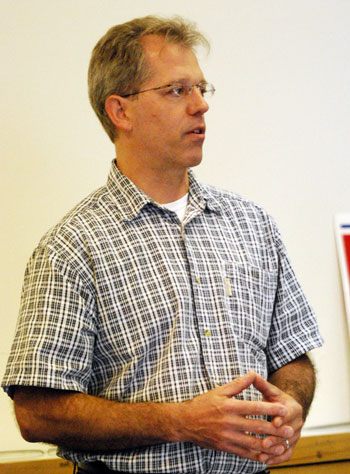
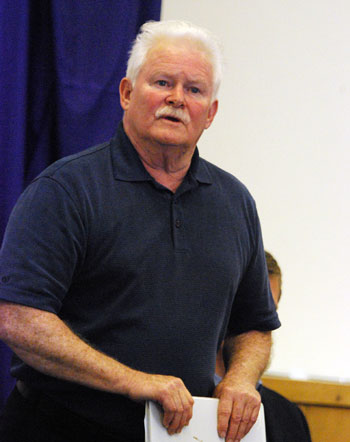
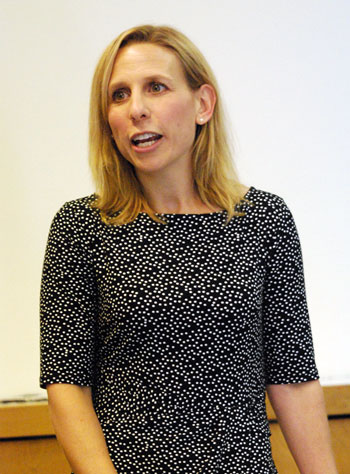
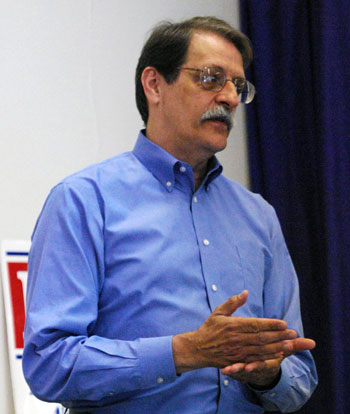
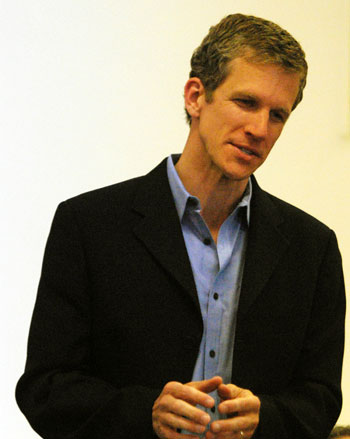
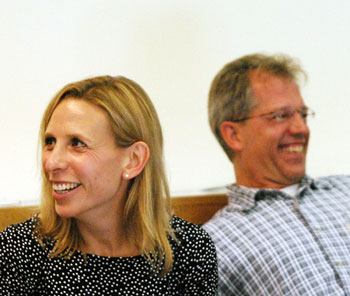
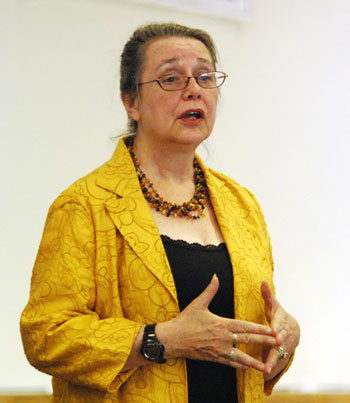
The Ann Arbor Mixed Use Party is planning on fielding candidates as independents this fall. See [link]
Jaclyn Vresics, a U-M student, has pulled petitions to run against Sabra Briere in the First Ward.
The Ann Arbor Mixed Use Party meets at 8:00 a.m. on the last Sunday of every month.
Correction: Meeting time is 8:00 p.m. (evening).
the depth of mike anglin’s ignorance is astounding! how can he represent his ward when he doesn’t know the first thing about accessing basic information like council minutes?
Your comparison of the Council’s composition then and now is a bit curious, since 2007 was when three new councilmembers were elected – Sabra Briere, Stephen Kunselman, and Mike Anglin. I don’t recall whom Kunselman replaced (he ran for an open seat), but Mike Anglin replaced Wendy Woods, who was originally appointed by John Hieftje and thus became an instant incumbent, and Sabra Briere defeated John Roberts, appointed by John Hieftje. The new councilmembers took office only in November following the election and thus broke up what had been a solid phalanx of Hieftje supporters (who rarely if ever rocked the boat on any vote).
A better contrast would have been to look at 2006, or earlier in 2007.
@Vivienne Armentrout:
“I don’t recall who Kunselman replaced….”
In 2009 Kunselman defeated Leigh Greden by six votes.
Tim Colenback, former AADP chairman called it the biggest electoral upset in the last 30 years in Ann Arbor.
Both Dave Cahill and Pat Lesko predicted the upset win and Cahill correctly chose Kunselman as the primary winner due to name recognition as he held office previously in the Third Ward. It was the year of E-Mailgate. Kunselman had been knocked off City Council in 2008 by Christopher Taylor by a 26% margin of defeat.
I do not believe John Roberts was an incumbent when he was defeated by Briere in 2007 as he as previously beaten by Ron Suarez – who coined the term “Gang of Seven” on City Council.
“A better contrast would have been to look at 2006, or earlier in 2007.”
Obviously I disagree, because late 2007 is the composition of the council I chose to present. And the basis for that choice is that it’s the specific year and council composition that both Mike Anglin and Sabra Briere cited at the forum, drawing upon their own experience when first elected to the council – in 2007. And because that was the context for the forum’s discussion, that made it the best year to present to readers as a reference point, if a choice had to be made.
To fill in the unrecalled history, Kunselman won election in 2006 in a three-way race that included Jeff Meyers and Alice Ralph, to fill the open seat left by Jean Carlberg.
As far as Hieftje appointing people to fill vacancies, that’s the duty of the council not the mayor. From the city charter [emphasis added].
And Roberts was not even Hieftje’s preferred choice to fill Groome’s vacancy, as the Sept. 6, 2005 council minutes record that he voted with a three-member minority to appoint Tim Colenback instead of Roberts. The three voting for Colenback were Carlberg, Johnson, and Hieftje.
Ah well. You think the council made those choices? Fine. What Anglin and Briere meant by mentioning 2007, I don’t know.
@peg dash fab writes, “the depth of mike anglin’s ignorance is astounding! how can he represent his ward when he doesn’t know the first thing about accessing basic information like council minutes?”
Are you referring to the comment Mike made about the importance of people knowing who voted which way?
If so, the issue is not Mike’s ignorance, but rather Hieftje’s ignorance of the use of Robert’s Rules of Order. Council uses an unrecognized combination of Voice Vote and Rising Vote, and rarely uses the Roll-Call Vote. Marcia Higgins, Sabra Briere and other members of the Council Rules Committee are expected under the auspices of Robert’s Rules to come up with guidelines about how and when roll-call votes are used.
Voice Votes don’t include a roll of who voted which way. Sometimes those covering the meetings record that information, and sometimes they don’t. Mike’s concerns highlight the Mayor’s ignorance of Robert’s Rules.
Re: “Marcia Higgins, Sabra Briere and other members of the Council Rules Committee are expected under the auspices of Robert’s Rules to come up with guidelines about how and when roll-call votes are used.”
Roll call votes are sometimes required for a statutory reason (e.g., the vote to go into closed session). In other cases, the council’s rules already provide a general guideline [emphasis added]:
And whatever you think of John Hieftje, when there is a dissenting vote or votes cast on a voice vote, he is systematic in his role as presiding officer in taking one of two actions: (1) simply asking for a roll call himself (2) querying the councilmember(s) who cast a dissenting vote to see if they want a roll call. In the case of (2) sometimes the roll call is requested, sometimes not. And by rule, if Hieftje were to fail to implement (1) or (2), any councilmember who wanted a record of the vote could request it and one would have to be provided.
So if the complaint is that Hieftje is presiding over council meetings in a manner that prevents councilmembers’ votes on specific items from being recorded by name, then I don’t think that complaint is well founded. Anglin’s complaint at the June 8 forum was not, however, about whether roll call votes were taken, but rather specifically about the lack of a resource where residents could go look up how a councilmember voted on a particular issue. And that resource already exists. If you want to complain about the user-interface for Legistar, I’m not going to defend it as the very best design work ever. But I use it successfully all the time to look things up.
My sense is that the source of actual complaint here is that “peg dash fab” hasn’t been particularly generous in pointing out that it’s a bit surprising that Anglin as an experienced councilmember doesn’t seem to be aware of what Legistar offers as a resource, and drawing the worst possible conclusion from that. Anglin is not alone on the council, however, in not fully appreciating the valuable resource Legistar can be. For example, John Hieftje seems unaware of how easy it is to track committee, board and commission membership terms using that piece of software. For example, it’s possible to look up the composition of the council’s rules committee, which other three members – besides Briere and Higgins – are Kunselman, Hieftje and Taylor.
I think that councilmembers would gain a better appreciation for what information is and isn’t available to the public, and how well or poorly it works, if they had to use exactly the same system the public does in accessing all their agenda information. Instead, the information is pushed to them in a separate .pdf that’s custom crafted out of Legistar in an extra step – from what I’ve heard described. The council’s version sometimes includes items not available to the public, most commonly the application materials for board and commission nominees. In any case, it’s emailed to them – and they don’t have to go retrieve it from Legistar.
Incidentally, planning commission and AATA board are two bodies that use a combination of voice vote and rising vote (show of hands). I don’t recall ever having witnessed a rising vote used at a city council meeting (that is, a count taken by show of hands, asking people to stand and be counted etc.) Perhaps there’s been one, or I’m deficient in my understanding of what qualifies as a rising vote.
To clarify Mike Anglin’s comments on the published voting record of council members, I read the minutes of the Feb. 17, 2009 meeting at which council approved the underground parking next to the library. Sure enough, the minutes contained the roll call vote which showed that Mike was the only dissenting vote.
On the other hand, if you want to know how a council member voted on a “voice vote”, the names are not reported.
I don’t recall if important votes are taken by voice. If that does happen, it would be useful if the minutes showed each member’s vote.
Because many votes are taken by voice, and often these are not unanimous, there is no official record of how members voted on a large number of resolutions.
Re: “Because many votes are taken by voice, and often these are not unanimous, there is no official record of how members voted on a large number of resolutions.”
As Jack Eaton pointed out at the forum, the vast majority of council votes are actually unanimous. And I would reiterate that when a voice vote is not unanimous, it’s Hieftje’s practice to just automatically tell the clerk to call the roll (typically when it’s enough voices for and against that it’s not totally clear what the outcome was), or else ask if the dissenting councilmember(s) would like the vote recorded as a roll call (typically when it’s a lone vote of dissent). And by rule, any councilmember can force a roll call vote on any question when they deem it important enough to want their vote recorded. Similarly, if a councilmember on the prevailing side wants to ensure that the dissenter has to live with that vote with their record, they’re free to demand a roll call.
So I just don’t see that there’s a significant problem here that requires a solution.
Forced to identify some problem with city council voting procedures, I’d say: Literally calling the roll with the clerk keeping a tally on a sheet of paper is pretty inefficient, don’t you think? Why not acquire the hardware to allow councilmembers to vote on every question electronically, with a display of how they’re voting, and the software to integrate the results directly into Legistar? Then every vote would be recorded by name, and it would go way faster. Why not? Well that stuff costs money, and there’s way lower-hanging fruit if the goal is to increase the proportion of time spent at a council meeting on productive deliberations.
Actually, on important votes there is a strong psychological importance to having to voice your vote. I’d hate to see a system whereby votes are merely recorded digitally. It would also remove an important feedback for the audience.
I’d like to note that Robert’s Rules of Order are guidelines, not a legal requirement. The only time they become required is when the body’s own rules call for their use. Typically, the bylaws or published rules call for Robert’s Rules of Order, but may also institute some exceptions. If you have ever followed the US Congress in its deliberations, you’ll note many, many exceptions to RROO. One of the elements of RROO that is often not followed on the Council is dividing the question. I recall that this was not permitted by the Mayor on at least one occasion, when attempted by Jane Lumm.
I have not seen the Council rules. Are they published somewhere? Those rules should also clarify when a call for ayes and nays, vs. a roll call vote, is appropriate. Assuming (and I will) that the moderator (the mayor) is fair, this should not be a problem. As described above, any councilmember may request a roll-call vote, so momentous votes will be thus recorded.
Re: council rules … “Are they published somewhere?”
It’s a crappy answer to say, “Oh, they’re on the city website.” But they are. And still it’s a crappy answer.
Whenever I hear a staff member say, “It’s on the city website,” I stop listening to whatever description they give for how to navigate to the information on the city website. Because it’s way easier, and you get excellent results, by using Google’s site-specific search syntax. Type this into the Google search bar: “site:a2gov.org searchterm1 searchterm2 searchterm3 etc”
Here’s what you get when you type in “council rules” using that technique: [link]
“My sense is that the source of actual complaint here is that “peg dash fab” hasn’t been particularly generous in pointing out that it’s a bit surprising that Anglin as an experienced councilmember doesn’t seem to be aware of what Legistar offers as a resource, and drawing the worst possible conclusion from that. Anglin is not alone on the council, however, in not fully appreciating the valuable resource Legistar can be.”
Anglin doesn’t seem to be….Anglin is not alone on the council, however, in not fully appreciating….
Making assumptions about what Mike Anglin knows or doesn’t know isn’t journalism. It’s speculation. How’s about you ask Anglin and Hieftje and get back to us? I’ll be really interested to see if Hieftje admits to what you imply is his ignorance about how the database could be used to track appointments, or blame the problem on someone else. As for Mike Anglin, I’m confident he’ll tell you the truth; he poked fun at himself for not using Facebook at the candidate forum.
Legistar is a great database resource when the City Clerk updates it in a timely manner and updates it correctly. She hadn’t done this with the CDAC appointments, which prompted a lot of questions from me in my A2Politico piece about Ray Detter’s “reports” to the DDA and your “chronicling” of his “reports,” when records showed his appointment had expired in 2012 — not to mention the fact that the Charter defines CDAC appointment terms as 3 years.
Ray shouldn’t feel singled out. Legistar shows many other irregularities with respect to the Mayor’s appointees.